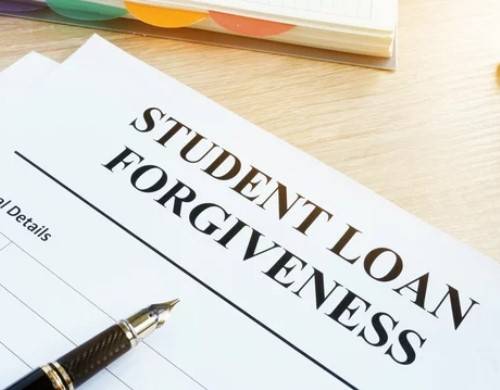Obtaining a college degree is more important than ever, and for most students, it comes with the added burden of student loans. The cost of a college education has risen in the past 30 years by more than double its original price.
This has led many students to graduate from college with an average of $28.950 in student debts. And as living costs soar, many students struggle with paying off their student debts, increasing the rate of payment delinquencies.
The good news is that there are various student loan forgiveness programs available that can help alleviate the financial strain for qualified borrowers. By understanding student loan forgiveness application procedures, you can make informed decisions about your student loan debt and explore the various student loan forgiveness programs.
Student Loan Forgiveness In A Nutshell

Student loan forgiveness is a program designed to eliminate some or all of a borrower’s federal student loan debt. This means that borrowers who have taken out student loans are able to have some or all of their remaining loan balance forgiven or discharged. They no longer have to repay that portion of the loan.
This is typically done as a reward for fulfilling certain qualifications, such as working in certain professions or meeting certain income requirements. In some cases, student loan forgiveness is offered in exchange for rendering years of service. In addition, unfortunate incidents such as bankruptcy, total and permanent disability, or death qualify students to have their student loans forgiven.
Student loan repayment programs offer different amounts of debt relief, from as low as $10,000 to as much as $120,000, depending on the various eligibility factors.
The government offers several forgiveness programs, each with its own requirements and eligibility criteria. By forgiving some or all of the remaining loan balance, students can reduce or eliminate the financial burden of student loan debt.
It’s important to note that apart from the circumstances where you can qualify to have your loan forgiven, canceled, or discharged, you remain responsible for repaying it. Despite taking out the loan as a minor (under 18 years of age), the promissory note you signed remains binding. So if you’re facing difficulties repaying a student loan, get immediate help and don’t risk defaulting to avoid unnecessary future complications.
Likewise, most student loan repayment programs have strict deadlines. They may be paused from time to time depending on their capacity or a court-ruled order, such as in the current Biden-Harris Administration’s Student Debt Relief Program status.
Types Of Federal Student Loans Eligible For Forgiveness
First, it's important to understand that not all student loans are eligible for forgiveness. Only federal student loans are eligible for forgiveness, and most private student loans do not qualify. However, you can still find debt relief from private student loans from other sources, such as non-profits or employers, that help repay student debts.
The federal student loans that are eligible for forgiveness include:
- Direct Loan Programs
- Federal Family Education Loan
- Federal Perkins Loan Program
- Defaulted Loans
- Subsidized and Unsubsidized Loans
- Parent PLUS Loans
- Graduate PLUS Loans
- Consolidation Loans
These loans must be disbursed on or before June 30, 2022, to be eligible for relief. To learn more about the different types of qualified loans, you can visit the Federal Student Aid website for information.
Who Are Qualified For Student Loan Forgiveness
Several types of student loan forgiveness programs are available, each with its own eligibility criteria. Here are some of the most common programs and who may qualify:
Public Service Loan Forgiveness (PSLF)
This program is available to those who work in certain public service jobs, including government agencies and non-profit organizations. To be eligible, borrowers must make 120 qualifying payments while working full-time in a qualifying job.
Teacher Loan Forgiveness
This program is available to teachers who work full-time for five consecutive years in a low-income school or educational service agency. Depending on the subject area taught, teachers may be eligible for up to $17,500 in loan forgiveness.
Perkins Loan Cancellation
This program is available to those who work in certain public service jobs or occupations that provide public service, including teachers, firefighters, and nurses. The amount of loan forgiveness depends on the type of service and the length of time served.
Income-Driven Repayment Plan Forgiveness
This program is available to those who enroll in an income-driven repayment plan, where monthly payments are based on income. After 20 or 25 years of payments, depending on the plan, any remaining balance is forgiven. Defaulted loans do not qualify for this type of student loan forgiveness.
Some of the plans under this debt forgiveness program include the Pay As You Earn Repayment Plan (PAYE Plan), Income-Contingent Repayment Plan (ICR Plan), and the Income-Based Repayment Plan (IBR Plan).
Loan Discharge
Those who suffered from total and permanent disability or declared bankruptcy may have their loans discharged or canceled as long as they meet the eligibility requirements. Borrowers who’ve also died or whose school they’re enrolled closed are eligible for loan discharge.
Loan Forgiveness For Health Care Professionals
Several loan repayment programs are available for those who work in underserved communities or are in the healthcare profession. The NURSE Corps Loan Repayment program is available for registered nurses, nurse practitioners, or nurse faculty members with over two years of employment.
The NHSC program is available for licensed healthcare providers who commit to working for at least two years at an eligible site. In addition, healthcare providers can get higher amounts of their loans forgiven in exchange for more years of service, such as the Students to Service Program, which forgives as much as $120,000 in exchange for three years of service.
Loan Forgiveness For Military Members
Those who serve in the military can enjoy loan forgiveness offered to Army and Navy doctors, other members of the armed forces, and veterans. In addition, all military branches have their own loan repayment assistance programs, which can cover up to $65,000 in student debt.
Loan Forgiveness For Lawyers
Becoming a lawyer is expensive, and there are loan repayment programs offered mainly by states and universities, as well as the Justice Department, to help alleviate the burden of law school expenses. To qualify, you need to be part of an eligible organization, be a public defender, or be an alumnus of the sponsoring university.
Loan Forgiveness From Employers
If you’re not a healthcare professional, lawyer, teacher, or military member, you can still get student loan forgiveness from your employer. Some companies offer this benefit, especially after the CARES Act of March 2020 gave 401(k)-like tax benefits to match employers' federal and private student loan payments.
Applying For Student Loan Forgiveness
If you think you may be eligible for student loan forgiveness, the first step is to research the different programs and their requirements. Depending on the loan repayment program, different types of student loans may be eligible. Some programs are also strict about accepting only those loans with a good repayment history.
Once you determine which program you may qualify for, you must complete an application. Applications can be made through the program’s website or by talking to your university student counselor for assistance.
For most programs, you must submit an application and provide documentation to prove your eligibility. This may include proof of employment, tax returns, and other documentation to verify your income and loan repayment history.
It's important to note that the application process for student loan forgiveness can be lengthy and complicated, so it's best to start the process early and seek help if needed.
Some loan repayment programs conduct a lottery where they pick lucky recipients regularly. Others have a strict deadline, only accepting applications up to a certain date before pausing the program. Knowing the program mechanics will help set your expectations and guide you in the application process.
Takeaway On Student Loan Forgiveness Application
You don’t have to drown in debt. Student loan forgiveness can be a valuable resource for those struggling with student loans and need a way to get out of it.
However, understanding the student loan forgiveness application requirements and process is crucial. Check the different programs and their eligibility requirements before applying. Take the time to research your options and seek help if needed to ensure a successful application process. The application process can be lengthy and the slots may be limited, so start early and be patient.
Student debt may seem suffocating, but it doesn’t have to be. With the programs listed above and with determination, you can get most, if not all, of your student loans forgiven.
Need more resources on student loans? Check out this post on government grants that can help you pay for student loans.
If you want to learn more about Pell Grant forgiveness, visit our blog about it to learn more.



